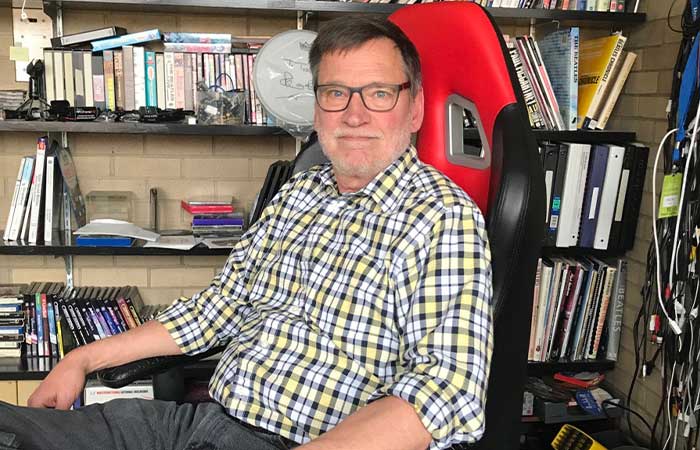Humans of Drake: Professor Todd Evans

Highlighting the stories of Drake students and faculty.
“A man can never have too many cars or guitars.”
This has become somewhat of a mantra for Todd Evans, professor of digital media production in Drake University’s School of Journalism and Mass Communication.
A suburban Chicago kid and a lifelong rock ‘n’ roll fan, Evans grew up in the constant presence of music. His mother studied music and was a pianist, and he picked up the drums from his brother, a musician himself.
“Keith Moon (of the Who), being one of the most bombastic drummers of all time, he was a great influence,” Evans said. “I wanted to be bombastic.”
And he certainly did his best. Though not having the “discipline,” as he says, to fully commit to musicianship, he had his fair share of adolescent garageband stints.
Then, when he got to college, he decided to study television and radio. The work compelled him so much that he finished in three years, and after a few odd jobs—including custom van building (it was the ‘70s) and house-sitting—he went back to get his master’s degree.
His ultimate aspiration was to produce music videos after he discovered MTV, which he describes as a jaw-dropping experience, but either karma or fate (both of which Evans believes in) had other plans for him.
He was corralled into a teaching position at Drake by former faculty member Michael Cheney, who Evans said is “every bit the rock ‘n’ roller I am.” Together, they decided to create a first-year seminar course on the history of the genre.
It turned into the grandiose-ly titled course, The Politics, Economics and Culture of Noise: the Life and Times of Rock ‘n Roll, which soon began to shift its focal point to Evans’ lifelong source of wonder: The Beatles.
“We found that the interest was so great from students on the British Invasion,” Evans said. “At the time, there weren’t a lot of schools that were teaching Beatles classes—this is the late 1980s. The Beatles are nothing. It was kind of unique when we started doing it.”
Now, the course has completely shifted into an extensive cultural, musical, historical and political analysis on the band. After all these years, he’s still just as enthralled with the topics of his now infamous Beatles course.
“Nobody’s ever been able to explain the phenomenon,” Evans said. “Here we are, nearly 60 years after they broke on the scene … why are they selling more records now than they ever did? Why are there more college classes on the Beatles now than there ever has been? Why do you care? See, I want the answer.
“And every semester, there are a-ha moments for me, pieces of the puzzle that I never put together before. But I’m not going to live long enough to get all the pieces of the puzzle. If I ever got the answer, I wouldn’t teach the class anymore,” Evans said.
When he first started teaching at Drake, he thought he’d stay in Iowa for three, maybe four years. It’s been 34, and he’s not going anywhere. The chances he’s been given to teach radio, television, media production, Beatles facts and rock ‘n’ roll history have kept him incredibly pleased with where he’s at.
“I’m still learning from it,” Evans said. “And it’s like the coolest thing in the world. You want to know. I was there. I experienced it. And you actually want to pay me to tell you about everything that happened. How many professors can say that they’re that fortunate?”
When he’s not on Drake’s campus, he likes to be an automotive handyman for his two cars, one of which is a Camaro SS Convertible. It’s pretty recognizable in the Olmsted parking lot, especially with its TVPROF license plates.
He also spends time caring for his three “giant” dogs, one Newfoundland and two Leonbergers. To keep up with his rock ‘n’ roll image, he also owns seven or eight guitars.
Evans describes himself as outspoken, with a tendency to shamelessly speak his mind in really any situation. Or, in his wife’s words, he demonstrates his “frontal lobe damage.”
Evans laughed about the root of this character trait, which may come from a particular experience in his adolescence. I don’t feel the need to include it here, but maybe if you go and ask Evans yourself, he’ll enlighten you. As he’s said before, he’s an open book.
